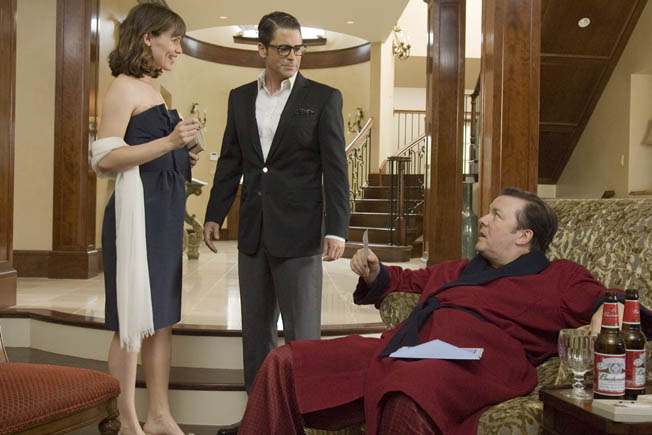The Invention of Lying

Mark Bellison (Ricky Gervais, "Ghost Town") is an unattractive loser living in an alternate reality where everyone unquestioningly always tells the truth. When he asks Anna McDoogles (Jennifer Garner, "Juno," "Ghosts of Girlfriends Past") on a date, her consternation that someone not in her own physical league is very real, but when he approaches her a second time he has an ace up his sleeve - "The Invention of Lying."
Laura's Review: C+
Now here's a movie that is being mismarketed - one would get the impression that this is another romantic comedy given a clever twist, when the romantic comedy is but a subplot in a comedy about religion. Cowriter/Codirectors Ricky Gervais ("The Office") and Matthew Robinson, both making their directorial debuts, take the old adage 'if God didn't exist, man would have to invent him' and have their main character do just that. Unfortunately, the underpinnings of their conceit don't hold up very well, but the film coasts by on its funny lines, performances and surprise cameos. As we gaze at a picturesque town (the film was shot primarily in Lowell, MA, an old mill town), Bellison informs us in voice over that he lives in a parallel reality where there is 'no deceit, no flattery, no fiction.' He works as a screenwriter for Lecture Films, which produces only historical documentaries, and where his decision to write about the Black Plague has cost him his job (which his secretary Shelley (Tina Fey, TV's "30 Rock") delights in telling him about in advance). Faced with eviction, Mark heads to his bank, but when the teller informs him she cannot tell him what his balance is because the system is down, it suddenly occurs to Mark to ask for money than he has - and shes gives him it! (This is the first of the weaknesses in the writing, as there is no conjecture whatsoever as to why he, and only he, suddenly becomes able to 'say what isn't'.) When Mark's mother (Fionnula Flanagan, "The Others," "Four Brothers") is terrified on her death bed, the hospital doctors (Jason Bateman cameo!) and nurses do not have the best bedside manner and so, to comfort her, Mark makes up the afterlife. He is overhead and becomes a sort of Messiah. He also becomes rich when he returns to his boss (Jeffrey Tambor, TV's "Arrested Development") at Lecture with a 'lost' bit of history that sounds like an L. Ron Hubbard story crossed with "Samson and Delilah." All this propels him into Anna's league, but she will not commit because his genes will produce chubby kids with snub noses. Then Mark's jealous colleague Brad Kessler (Rob Lowe, TV's "The West Wing"), the former best screenwriter at Lecture, decides he'll take the one thing Mark cannot have... If only Gervais and Robinson had developed their material more logically. In their world, 'truth' is given voluntarily when normally nothing would be said. It equates more to blurting out whatever is on one's mind. The film industry is hedged into nonfiction filmmaking that is entirely non-cinematic and doesn't include real life stories that are not historical. Even worse, compassion is tied to lying and the lying man is overtly made up to appear Christlike. The film also looks lousy, lit so poorly that one's eye cannot help but be drawn to the acne scarring on Tina Fey's face. (The camera loves Garner though.) But Gervais is a likable, if unlikely, romantic antihero and Jennifer Garner is charming even when she's being rude and hurtful. Louis C.K. (HBO's "Lucky Louie") is a surprisingly solid sidekick and Jonah Hill ("Superbad," "Funny People") puts a lot of shading into Frank, Mark's suicidal neighbor. Philip Seymour Hoffman jolts just by showing up as bartender Jim and Ed Norton gets some laughs as a cop. Despite the flaws in their conceptual development, individual lines and scenes are often funny, such as Mark's delivery of the laws of the 'Man in the Sky,' taped to two Pizza Hut boxes, to a frustratingly literal-minded public. The product placement humor in the film is better realized than it's main theme. The film ends with the standard wedding altar cliche and reestablishes the film's underlying atheism, not the most uplifting exit. All those truth tellers also seem to be a bit dimwitted as well. It's only on the surface that "The Invention of Lying" entertains.
Robin's Review: DNS
DNS

